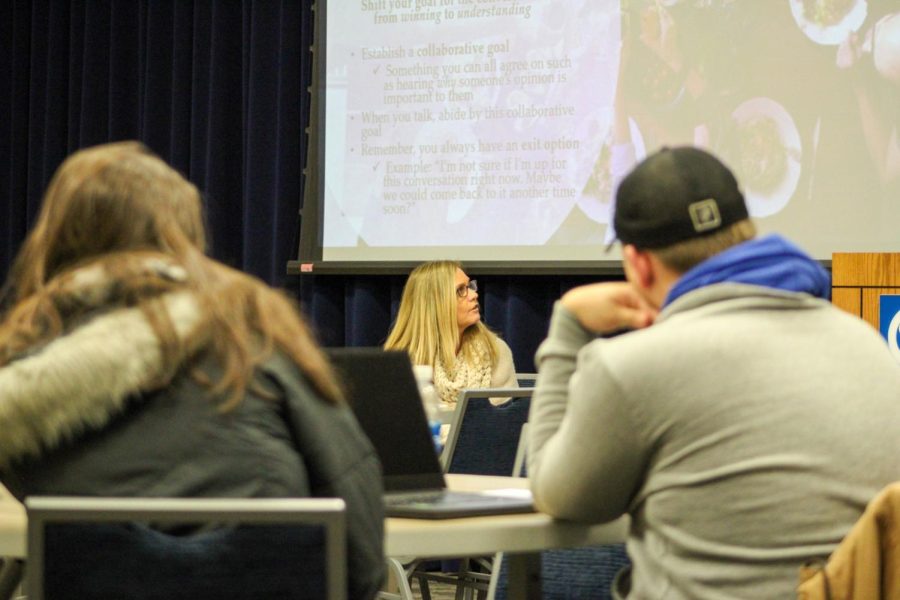GV holds Democracy 101 event centered on civil discourse during holiday season
Nov 21, 2022
On Nov. 16, Grand Valley State University continued its Democracy 101 series with an event focused on political preparation for the holidays.
Lisa Perhamus, the director of GVSU’s Padnos/Sarosik Center for Civil Discourse and associate professor of literacy, educational foundations and technology, gave a presentation titled “When Polarization Becomes Personal: Family Feuds and Friendship-Splits,” that equipped students with skills to navigate holiday season discussions.
For some, the holiday season is stressful. Oftentimes, generational differences between families can cause disputes. Times have changed rapidly, and some individuals may retain outdated ways of thinking that may be seen as less socially acceptable these days.
Throughout the holiday season, these differing points of view can clash during family gatherings.
Acknowledging this reality, Perhamus looked to provide tools for students to handle difficult situations and conversations with tact and grace.
Guidelines of civil discourse can be applied to many different areas; not only in academic scenarios, but also in informal situations such as a family meal. Conversations with family members and close friends are often more challenging than conversations with strangers due to the deep histories and emotional investments that are inherent to the interaction.
However, Perhamus urged students to investigate why people hold the beliefs they do. Asking why someone thinks the way they do is less hostile, Perhamus said, and it provokes empathy. Rather than reciting statistics and news headlines, delving into what she described as the “tree-root level” of perspectives leads to more meaningful and empathetic conversations.
“Most conversations happen at the tree-branch level, which is where your opinions lay,” Perhamus said. “This is where people throw statistics back and forth. The tree-root level, however, is really about the experiences you’ve had in your life that give shape to the opinions you have.”
Tapping into this deeper understanding of why someone thinks the way they do, she explained, helps family members and friends to view conflicting ideas through a more accepting lens.
When dealing with that one family member who always seems to have a dissenting opinion from yours, Perhamus recommended a few strategies to keep in mind.
“Resist conversation bait and decide when you want to engage,” Perhamus said. “Also, knowing when you need to exit a conversation is vital. Not every conversation is safe and productive, and it is completely acceptable to gracefully leave. Do not try to change a family member. You can only change yourself.”
Civil discourse is not about changing people’s opinions; it’s about hearing and acknowledging their points of view and reflecting on it thoughtfully even though either party may not be persuaded to another school of thought.
“People’s beliefs are often wrapped up in their core identities, and when their identity is challenged, they feel threatened,” Perhamus said.
During family gatherings, taking winning off the table is key to having civil discussions. Establishing a collaborative goal beforehand can help focus and regulate conversations. These methods of setting a set of ground rules can help transform difficult conversations with the family.
Through seeking to understand why someone holds the beliefs they do, conversations become less argumentative and instead cultivate a sense of curiosity about another’s thought process.
Perhamus also recommended exchanging resources that have influenced your point of view.
“While neither of you may change your mind, you will be more skilled and knowledgeable for the next difficult conversation,” Perhamus said.
Thanksgiving break is almost here, and with these tips in mind, Perhamus said she hopes that students can head into the holiday season with a plan in case of conversations going awry.






















